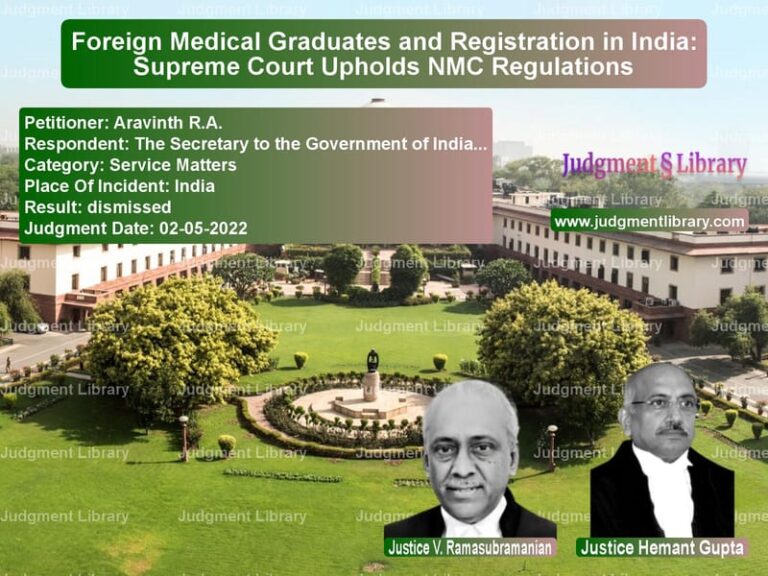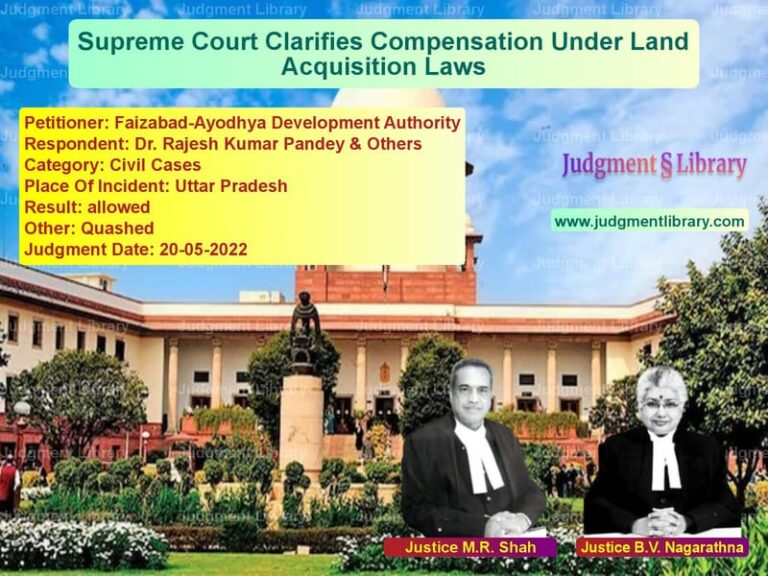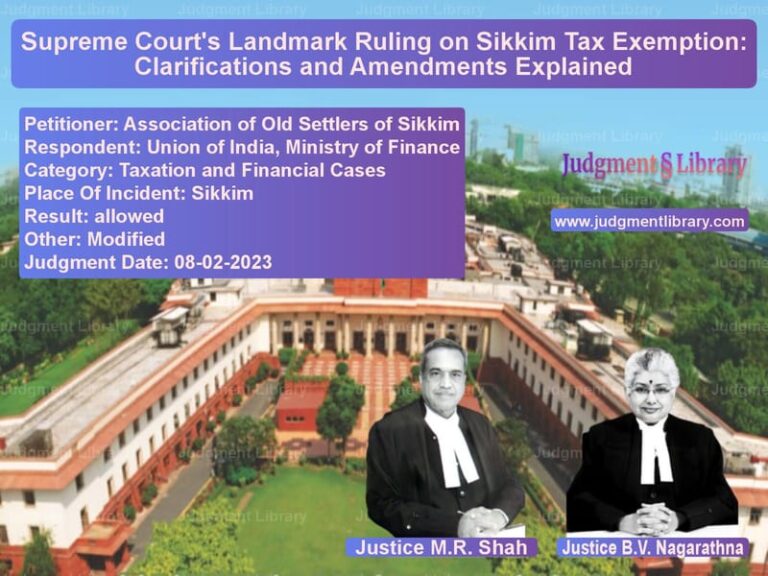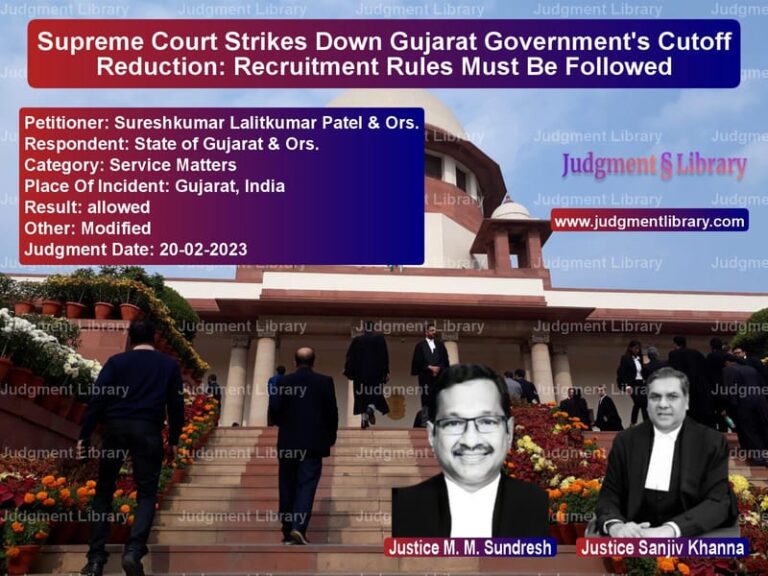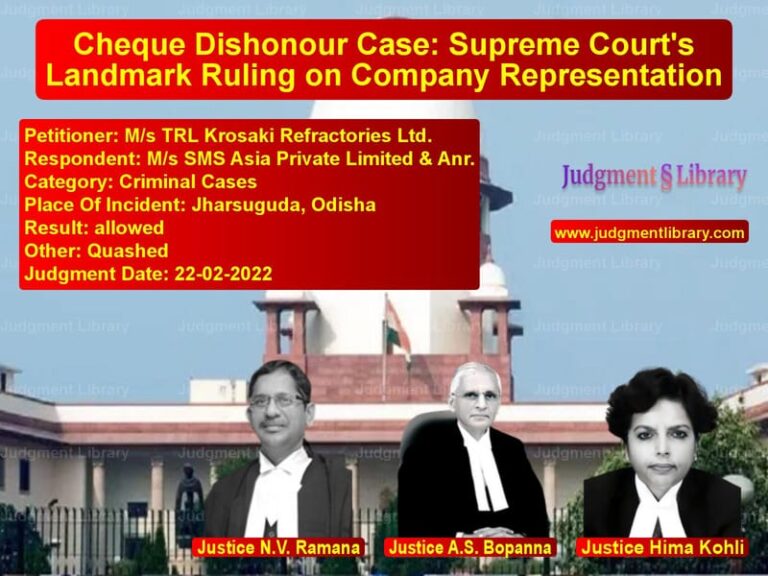Cooperative Housing Society Dispute: Supreme Court Declares Illegal Plot Allotment Invalid
The case of Shivkishan vs. Sujata Tarachand Makhija & Ors. revolves around the dispute over the allotment of a plot in a cooperative housing society in Nagpur. The Supreme Court, in its judgment on September 27, 2019, ruled that the allotment of Plot No.2 to the appellant was illegal and upheld the High Court’s decision to quash the sale deed executed in his favor. The ruling reaffirmed the principles of fairness, transparency, and adherence to the rules governing cooperative societies.
Background of the Case
The dispute arose from a claim over Plot No.2 in a cooperative housing society in Nagpur, Maharashtra. The first respondent, Sujata Tarachand Makhija, an employee of the Life Insurance Corporation (LIC), alleged that she was unfairly denied the plot despite fulfilling all membership and financial requirements. The cooperative society, primarily established for LIC employees, had a policy of allocating plots based on seniority and financial contributions.
The respondent had been contributing to the society since 1981, securing her eligibility for a plot as per the society’s regulations. However, in an unexpected turn, the society allotted the plot to the appellant, Shivkishan, who was neither a depositor nor a member at the time of allotment. The respondent argued that her rightful claim was ignored and that the plot was wrongfully given to an unqualified individual.
This led to legal proceedings under the Maharashtra Cooperative Societies Act, 1960, with the respondent challenging the validity of the allotment and subsequent sale deed.
Legal Issues and Arguments
Arguments by the Appellant (Shivkishan):
- The allotment of Plot No.2 was valid and carried out in accordance with the cooperative society’s decisions.
- A resolution passed in 1984 allowed the society to allocate larger plots to individuals outside the original depositors.
- The respondent was not a registered member of the society when the plot was allotted.
- The appellant’s membership was confirmed in a 1990 General Body Meeting.
Arguments by the Respondent (Sujata Tarachand Makhija):
- She had been a depositor in the cooperative society since 1981 and had made all necessary financial contributions.
- She had submitted the required membership application and payments, making her eligible for plot allotment.
- The appellant, at the time of allotment, was not a society member, did not contribute financially, and did not follow the required procedure.
- The allotment process was manipulated in favor of the appellant, violating cooperative housing norms.
Supreme Court’s Observations
The Supreme Court ruled that the respondent had a stronger legal claim to the plot and that the society’s allotment of the plot to the appellant was illegal. The Court noted:
“The respondent was a depositor and fulfilled all membership requirements. The society’s denial of her claim while allotting the plot to a non-member was arbitrary and illegal.”
The Court emphasized the importance of maintaining fairness in cooperative housing societies:
“Allotments in cooperative housing societies must adhere to established rules, ensuring fairness and transparency. The irregularity in this case warrants cancellation of the allotment.”
Addressing the appellant’s defense, the Court stated:
“The appellant was not present at the 1988 meeting, had not submitted an application, and had made no financial contributions before the disputed allotment. His claim lacks merit.”
Key Rulings and Conclusion
The Supreme Court upheld the High Court’s decision and ruled:
- The allotment of Plot No.2 to the appellant was illegal.
- The resolution dated March 25, 1990, and the sale deed executed on October 25, 1989, were quashed.
- The cooperative society must follow fair procedures when re-allocating the plot.
- Preference should be given to those who had opted for the plot in the 1988 meeting.
This judgment reinforces the principle that cooperative societies must maintain fairness in allotments and adhere to their own established policies. It also sets a precedent for similar cases involving cooperative housing disputes, ensuring that legal safeguards protect rightful members from arbitrary and unlawful actions.
Implications of the Judgment
This ruling carries significant implications for cooperative housing societies and their members:
- It ensures that cooperative societies adhere to their own governing rules and do not engage in arbitrary decision-making.
- Members who have fulfilled all requirements cannot be sidelined in favor of unauthorized individuals.
- The decision strengthens legal protections for members who have been unfairly denied allotments.
- It establishes a precedent for courts to scrutinize cooperative society decisions more closely.
Going forward, cooperative societies must conduct transparent and rule-based allocation processes to avoid similar legal disputes. This judgment serves as a reminder that irregularities in cooperative housing allotments will not be tolerated by the judiciary.
Petitioner Name: Shivkishan.Respondent Name: Sujata Tarachand Makhija & Ors..Judgment By: Justice Uday Umesh Lalit, Justice Vineet Saran.Place Of Incident: Nagpur, Maharashtra.Judgment Date: 27-09-2019.
Don’t miss out on the full details! Download the complete judgment in PDF format below and gain valuable insights instantly!
Download Judgment: Shivkishan vs Sujata Tarachand Mak Supreme Court of India Judgment Dated 27-09-2019.pdf
Direct Downlaod Judgment: Direct downlaod this Judgment
See all petitions in Property Disputes
See all petitions in Contract Disputes
See all petitions in Judgment by Uday Umesh Lalit
See all petitions in Judgment by Vineet Saran
See all petitions in dismissed
See all petitions in supreme court of India judgments September 2019
See all petitions in 2019 judgments
See all posts in Civil Cases Category
See all allowed petitions in Civil Cases Category
See all Dismissed petitions in Civil Cases Category
See all partially allowed petitions in Civil Cases Category


